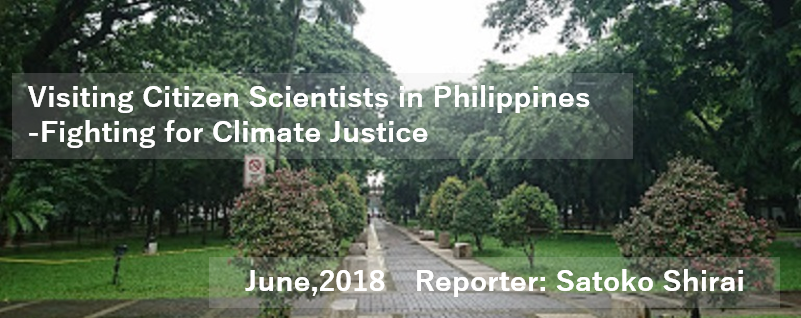
Introduction
From June 24 to 29, 2018, I went to the Philippines to visit one of our grant recipients,Philippine Movement for Climate Justice(PMCJ). The grant was awarded for "community participatory scientific research on the environmental and health impact of the coal industry", which comprises an environmental and health assessment of the area around the coal-fired power station. The local community participated in the study in order for the citizens to acquire knowledge about the power plant and an ability to prove its harmfulness if required.
Day 1: Visit of the Community Around the Area Where the Coal Power Plant is Scheduled to be Built.
The day after I arrived in Manila, I visited the location where the coal power plant will be built in the Province of La Union Luna. This plant will be 670 MW in capacity and will start to operate in 2020 according to the government’s original plan. Local citizens are against this project because of concerns regarding the health hazards caused by air and groundwater pollution, the impact on the local ecosystem, for instance destruction of the landscape, and the unavoidable impact on tourism.
As soon as I arrived in Luna, I met up with local citizens and other stakeholders whose place of work is the site.At the lunch meeting, I asked participants to introduce themselves; it turned out the group consisted of lawyers, professors, teachers, environmental sociologists, scientists, and other experts, including retired professionals along with several coordinators. With this high level of competence in the room, I immediately got the impression that the region would be more than apt to directly negotiate the issue with the relevant authorities. From our conversations, it seemed that some of them had informal connections with people close to policy makers. In fact, PMCJ had pointed out that while Luna is one of the many communities they work with, their high and effective level of coordination was likely to delay construction of the power plant.
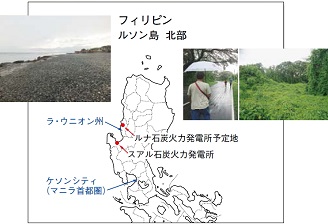 The photo shows the proposed Luna coal-fired power plant construction site and the surrounding coast. |
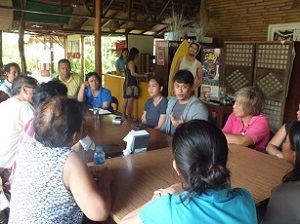 Discussions between PMCJ staff and Luna residents |
Day 2: Press Conference on the Statement ‘Stop Coal Investment and Financing!’
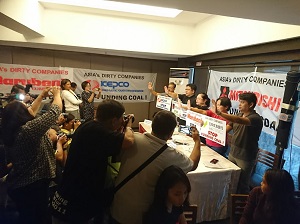 Joint press conference asking "dirty Asian companies" to stop investing in and financing coal power generation. |
On this day, PMCJ was going to hold a joint press conference with APMDD (Asia Peoples Movement on Debt and Development) and make a statement asking ‘dirty Asian companies,’ including Japanese ones (four Japanese companies and one Korean company), to stop investing in and financing coal power generation, so I left for the site. At the press conference, it was also announced that protest movements would be held in front of each company's building on a day where public attention would be high, as these companies were to hold general stockholder meetings the following day.
Japanese companies pinpointed as ‘dirty companies’ are the three major banks, Mitsubishi UFJ, Mizuho and Mitsui Sumitomo, and the general trading company Marubeni (the Korean company is KEPCO). According to the 2018 Fossil Fuel Finance Report/Ranking issued by environmental NGOs, while Chinese banks and American banks, due to an increase in oil sand supply, rank high in the global ranking of fossil fuel financing, large Japanese banks rank high in coal power financing. These companies have hence already received significant scrutiny on their activities in Asia where coal-fired power generation is widespread.
Recently, Japanese financial institutions have been forced to take immediate action as a result of the rise in ESG (Environment, Society, Governance) investment, which encourages companies to take environmental and social aspects into consideration and to divest (pull the plug on investments in) environmentally costly assets. Environmental NGOs have launched high-profile campaigns based on the ‘Paris Agreement’, an international framework for tackling climate change. However, no Japanese media was present at the event.
Day 3: Visit of the PMCJ Office
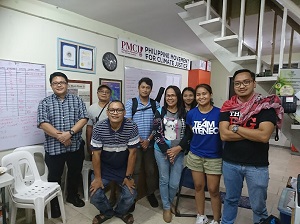 At the PMCJ office |
n between the protest movements, I visited the PMCJ office and talked with Mr. Rivera Bibiano, an applicant for the grant program. PMCJ drew a stakeholder organization chart, which showed that many organizations from international NGOs to local citizen groups were connected vertically and horizontally. As part of its mission to pursue Climate Justice, a phrase that is included in the organization's name, PMCJ is working as a grassroot organization (they call it ‘Coalition’) that aims at stopping coal-fired power generation, as this ‘dirty’ technology accelerates climate change.
‘Climate Justice’ asserts that fighting climate change is not just a matter of environmental custody, but one related to social justice: The countries responsible for most of carbon emissions, among which stands Japan, are not the ones who will suffer the consequences most direly. In emerging countries, consumption of energy per capita is much lower than in developed countries. In addition, workers in emerging economies typically rely on the environment more for their livelihoods, be it through fishing or agriculture. The recent increase in abnormal weather, which has been described as ‘the strongest in recorded history’ or ‘unprecedented’, naturally means that the impact on these workers will only worsen. Moreover, the poor, who are consuming all of their energy supply just to get by, are not well prepared for disasters. They have little resilience to shocks: rebuilding their lives after a catastrophe is nearly impossible. In the Philippines where the poverty rate is high and typhoons cause yearly damages, climate change and poverty cannot be considered separately. For this reason, PMCJ, which is aiming for climate justice, also works closely with organizations that address poverty issues.
PMCJ's activities comprise research (e.g. research on local environment and health impact), legal measures, advocacy, media strategies, and typical street actions (protest movements). The organization combines these activities for maximum efficacy and teams up with relevant organizations, ranging from international NGOs to citizens' groups in communities where coal fired power plants are located. A more categorical approach is taken toward coal power plants both locally and internationally, however, in view of the high damage they inflict on the environment and nearby citizens’ health.
PMCJ has a total of 10 staff, with at least four members being professionals in the practice of law (lawyers or law students). It struck me that the organization’s success was probably due to its staff’s deep knowledge of environmental laws and relevant legal procedures.
Day 4 (the last day): Protest Movements in front of Japanese Companies
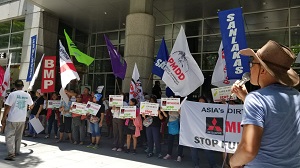 Protest movement in front of a building which hosts targeted Japanese companies. |
I traveled to the central part of Manila, where the protest movements announced two days before during the press conference were to begin in front of a few buildings hosting targeted Japanese companies. Since these buildings were located in the economy and finance center of the Philippines, protests had to be strictly controlled. Impeccable organization, especially right before and right after the demonstration, allowed the team to maximize their time actually protesting and increase the impact of their action.
When the protesters who rode in separate cars arrived at the designated location, they got out of the cars simultaneously while holding flags, placards and banners, and lined up in front of the building. The organizer read out a statement of protest, and the entire crowd chanted ‘Mitsubishi / Sumitomo!!! Stop funding coal!!!’. Protesters stayed in the same location for up to 20 minutes and then moved on to the next one.
The demonstration was to span two days: Protesters would target Mitsui Sumitomo and Mitsubishi UFJ bank on this day, and Mizuho Bank and Marubeni on the second day.
Conclusion
I was originally supposed to observe community-based water quality research, but ended being a witness to a protest against Japanese companies’ investment in coal power generation. This demonstration was the result of a cooperation between the public and private sectors. While, as a Japanese, the actions taken toward companies that are part of our daily lives could come as a shock, I couldn’t help but feel deeply sorry for the sorrow Japan has caused, first during wartime and now as an investor, to the people of Manila.
Throughout my stay, I was puzzled over the reasons that have pushed Japan to defy global trends toward sustainable energy and invest, not only private but public funds too, in coal power plants in Manila, despite the many opposing voices of the local community. Japanese companies have argued they are helping the economic development of these regions thanks to high-efficiency electricity generation. And yet, divestment from coal plants has only accelerated internationally under pressure from Western institutions.
In recent years, the United Nations’s Sustainable Development Goals (SDGs) have gained in importance. Goal 7 and Goal 13 tackle climate change, but have only garnered insufficient results and low commitment os far. The energy sector still needs to be reformed to revert its current lack of control of greenhouse gas emissions and lack of progress in introducing renewable energy. Although Japan has taken the initiative in promoting SDGs by creating an SDG task force within its government, the country’s performance has only declined since. I left the Philippines feeling the depth of the gap between what Japan is doing as a country and what international society expects its government and companies to do.
Despite these complicated feelings, I could appreciate the insight gained from meeting with various local stakeholders. Civil society in the Philippines is more mature than in other Asian countries, owning to the fact that women’s rights have made greater progress there and that NGOs and local organizations’ right to participate in assembly activities is guaranteed. I could indeed witness the great potential and agility of Philippines’ civil society, which exhibits a true sense of solidarity between grassroot organizations that are not afraid to tackle huge challenges by joining forces. If anything, this sets an inspiring example for Japan’s NPOs and the maturing of its civil society.
